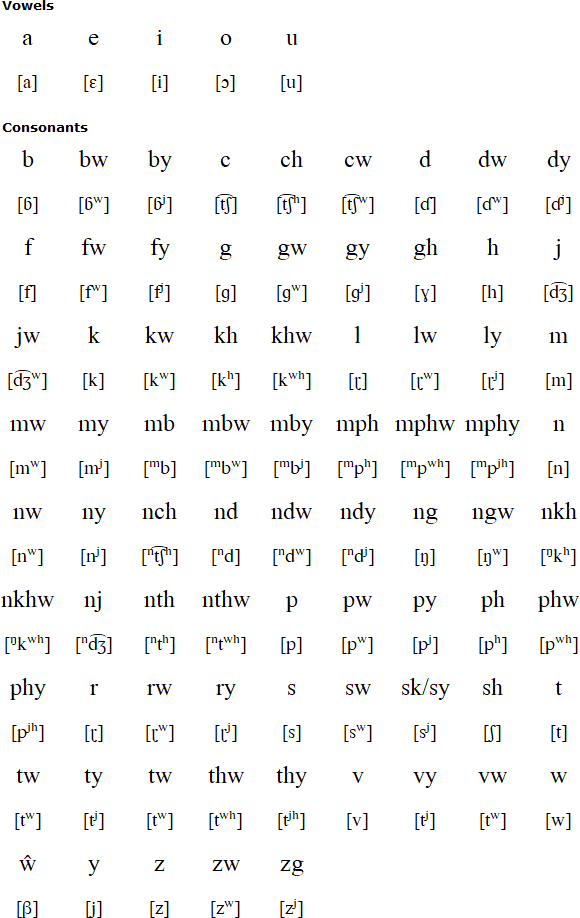Tumbuka is a Bantu language spoken by about 1.5 million people in northern Malawi and eastern Zambia. There were about 1.1 million speakers of Tumbuka in Malawi in 2009, particularly in the Rumphi, Mzuzu, and Mzimba districts on the west shore of Lake Malawi. In 2010 there were about 366,000 speakers of Tumbuka in Zambia, mainly in the Eastern and Muchinga provinces.
The Tumbuka spoken in urban areas of Malawi differs significantly from that spoken in rural areas, which is considered by some as the "real Tumbuka". Urban Tumbuka has borrowed vocabulary from Swahili and Chewa, while the Mzimba dialect has influences from Zulu, including some words with clicks.
Tumbuka is also known as Citumbuka, Tamboka, Tambuka, Timbuka, Tombucas or Tumboka.
Tumbuka was an official language of Malawi, but lost that status in 1968. Before then it was taught in schools and used on the radio and in newspapers. Since 1994 limited use of Tumbuka in books and the media has re-started. Tumbuka has no official status in Zambia.
There are two ways to write Tumbuka with the Latin alphabet: the tradtional spelling system and the new official spelling system, which is shown below.

Download an alphabet chart for Tumbuka (Excel)
Chitumbuka ni chiyowoyelo chachi banthu choyowoyeka ku mpoto kwa Malaŵi na mu Boma la Lundazi ku manjililo gha dazi gha Zambia. Chitumbuka chili m'magaŵa la viyowoyelo limoza na na Chicheŵa na chiSena (lochemeka Guthrie Zone N). Ŵakaswili ŵa viyowoyelo ŵa World Almanac mu 1998 ŵakati ŵo yowoya Chitumbuka Ŵalipo 2,000,000 kwe ŵanyakhe ŵakuti figala iyi njokhililapo.
Source: https://tum.wikipedia.org/wiki/ChiTumbuka
Information about Tumbuka | Phrases | Numbers | Tower of Babel
Information about the Tumbuka language
http://en.wikipedia.org/wiki/Tumbuka_language
https://www.ethnologue.com/language/tum
Online Tumbuka lessons
http://chitumbukalanguage.blogspot.com
Tumbuka phrases
http://wikitravel.org/en/Tumbuka_phrasebook
Aka, Bafaw-Balong, Bangi, Basaa, Bemba, Bembe, Bena, Benga, Bhaca, Bube, Bukusu, Bulu, Central Teke, Chichewa, Chokwe, Chuwabu, Comorian, Dciriku, Digo, Duala, Eton, Ewondo, Fang, Ganda/Luganda, Gogo, Gusii, Gwere, Haya, Hehe, Herero, Ibinda, Ikizu, Ikoma, Jita, Kabwa, Kako, Kamba, Kiga, Kikuyu, Kimbundu, Kinyarwanda, Kirundi, Kisi, Kogo, Komo, Kongo, Konjo, Koti, Kukuya, Kunda, Kuria, Kwambi, Lambya, Lingala, Loma, Lozi, Luba-Katanga, Luchazi, Lunda, Luvale, Luyana, Makaa, Makonde, Makhuwa, Mandekan, Maore, Masaaba, Mbama, Mbere, Mbukushu, Mbunda, Mbuun, Mende, Mongo, Mpiemo, Mushungulu, Mwani, Nambya, Nande, Ngoni, Nkore, North Teke, Northern Ndebele (South Africa), Northern Ndebele (Zimbabwe), Northern Sotho, Nyamwezi, Nyakyusa, Nyemba, Nyole, Nyoro, Nyungwe, Nzadi, Oroko, OshiWambo, Pagibete, Punu, Ronga, Safwa, Sena, Sengele, Shona, Soga, Songe, Southern Ndebele, Southern Sotho, Sukuma, Swahili, Swati, Tanga, Tembo, Tonga, Tooro, Tshiluba, Tsonga, Tswa, Tswana, Tumbuka, Umbundu, Venda, Vili, Vwanji, Xhosa, Yakam, Yansi, Yao, Yasa, Yeyi, Zigula, Zinza, Zulu
Languages written with the Latin alphabet
Page last modified: 14.04.24
[top]
You can support this site by Buying Me A Coffee, and if you like what you see on this page, you can use the buttons below to share it with people you know.

If you like this site and find it useful, you can support it by making a donation via PayPal or Patreon, or by contributing in other ways. Omniglot is how I make my living.
Note: all links on this site to Amazon.com, Amazon.co.uk
and Amazon.fr
are affiliate links. This means I earn a commission if you click on any of them and buy something. So by clicking on these links you can help to support this site.
[top]